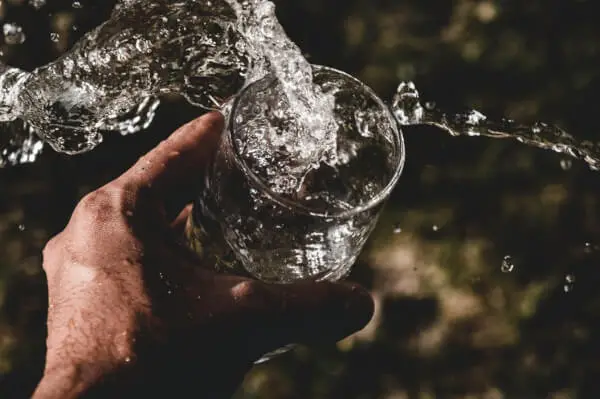Water, as we all know, is an important part of athletic success and not just as a way to celebrate. Whether you’re hiking in the desert, running a marathon or even taking a yoga class, you know staying properly hydrated is important.
We usually just think of hydration in terms of staving off dehydration but overhydration, also known as water intoxication, water poisoning, hyperhydration, or exercise induced hyponatremia, poses just as real of a health threat as dehydration.
That’s right, you can drink too much water.
Unfortunately, water intoxication is commonly misunderstood by the public, many athletes and coaches. This condition does have dire consequences if left untreated but is also highly preventable. If you like to be active and are proactive about your health, read on!
In this article we’ll talk about what exactly water intoxication is and go over its warning signs. Then we’ll discuss its health consequences and how it can be prevented so you can continue to cycle, run and have fun safely. See our piece on how to prevent overhydration to
Recommended Reading: We’ve written a whole article on hydration while hiking that you might be interested in.
Too Much Of a Good Thing Is Bad
Water is used in all cells, organs and tissues, making it instrumental in all of our body’s functions. We’re all aware of how important it is in maximizing our athletic performance as well.
As vital and abundant as it is, water is just as easily lost through our daily activities, like breathing, sweating, and digestion. The harder we work, whether it’s using our brain for that report due on Monday or our body as we crush a triathlon, the more water we lose and need to replace.
Because the amount of water in our bodies is so crucial to our overall health and it can be altered so unconsciously and easily, it’s important that we have the proper amount to keep things going smoothly.
Losing too much water and becoming dehydrated gets a lot of attention, no matter your activity. But here are some things you may not know about having too much water in your system.
Defining The Terms
Water intoxication, as it is typically referred to in medical circles, occurs when the ratio of sodium to water in the blood is diluted because there has been an over-ingestion of water.
Your kidneys can expel about half a liter of liquid in an hour, to ingest more water than that and without any source of electrolytes, puts you at risk for this illness.
Who’s At Risk?
It’s true that most of us are more at risk to develop dehydration but it is surprising how many activities can put someone at risk for water intoxication. There are two ways a person can fall victim:
Increased Water Intake
This means that a person is drinking more water than the kidneys can get rid of through urination.
Reasons people often drink too much water:
Exercise, prolonged amount of time in a hot environment, certain medications that induce thirst.
Those most at risk for the type of water intoxication caused by increased water intake include:
- Endurance athletes such as kayakers, hikers, cyclists and runners who are participating in their sport for four or more hours.
- Athletes participating in team sports like football.
- Children under one-year-old because of their low body mass.
- Those who are not used to the heat of the environment.
- Women. Women statistically experience higher rates of water intoxication and hyponatremia. Though the cause is not definitive, it’s believed to be due to having a smaller body mass.
A Look at The Numbers
The New England Journal of Medicine tracked 488 runners in the 2002 Boston Marathon. 13% of the runners suffered from water intoxication and since 1985, there have been eight documented deaths from water intoxication that have also been tied to long-distance events.
This statistic exemplifies how the public’s impression of hydration health vastly differs from the truth, and people are dying from misinformation.
Retaining Water
All this means is that a person’s body is unable to get rid of excess water.
Reasons people cannot get rid of excess water:
Usually medical issues, such as hormone imbalances, kidney problems, liver disease, congestive heart failure, and syndromes related to anti-diuretic hormones.
Those most at risk for the type of water intoxication caused by water retention include:
- Those with a preexisting medical condition, such as diabetes, cirrhosis or hormone issues that have to do with the thyroid or adrenal glands.
- Those who are elderly, their sodium intake may have decreased with age.
- Those on certain medications.
Early Symptoms Of Water Intoxication
Overhydration symptoms can be misleading in their early stages because they can be very similar to flu or heat exhaustion symptoms. It’s important to take the context of the person’s illness into consideration.
Have they been competing in a sport? Sweating profusely? Drinking large quantities of water over a relatively short period of time? We’ll break down the differences between heat exhaustion and water intoxication symptoms for you shortly.
First off, here’s a list of common early stage water intoxication symptoms:
- Headaches
- Vomiting and nausea
- Confusion and short term memory loss
- Clear urine, a well hydrated person’s urine should be light yellow
- Urinating more frequently than every few hours or if it interrupts sleep
Late Symptoms Of Water Intoxication
As water intoxication becomes more severe, the cognitive and physical symptoms become more intense and less like the flu or heat exhaustion.
Late symptoms include:
- Shouting, irrational behavior, delirium and loss of attention
- Irritability and restlessness
- Muscle weakness
- Muscle cramps and spasms
- Rapid breathing as the lungs fill with fluid
- Weakness & Fatigue
- Seizures
- Paralysis
- Extreme swelling of the limbs
- Loss of consciousness, which can lead to coma and death.
Heat Exhaustion Or Water Intoxication?
Heat exhaustion occurs when you have been exposed to high temperatures and either one of two deficits occur: salt or water. Heat exhaustion because of salt depletion resembles water intoxication.
Without a doctor and extensive testing, it can be difficult to tell which illness is occurring but with attention and investigation into recent events, you can reasonably determine if water intoxication or heat exhaustion is occurring.
Some tell-tale signs of heat exhaustion that are not present with water intoxication are:
- Rapid heartbeat
- Fainting
- Pale skin
- Sweating
- Dark urine
The Precarious Ratio Of Salt To Water
Another serious consequence of water intoxication is hyponatremia.
Hyponatremia is a condition that occurs when the level of sodium in your blood is lowered. Sodium is an electrolyte that helps regulate water in and around cells. The overabundance of water in your system dilutes your blood and causes the cells to swell.
Because of the excess amount of water present in the stomach, it will incorrectly read this as a sign to digest food.
Since there is more water than food, the sufferer’s appetite will be lost, nausea will develop and vomiting will occur. After experiencing dehydration, it is particularly easy to overcompensate by overhydrating.
Drinking excess water can get you into a terrible cycle as you may vomit and become dehydrated again.
Use caution and pace yourself when replenishing your fluids.
Effects of overhydration
Hyponatremia can develop from drinking too much water before, during and after exercise so it is important to not just focus on how much water you drink but when you drink as well.
Being aware of your hydration habits is the best way to prevent water intoxication and hyponatremia. For many, it is very common to binge drink water before or after an activity without realizing the serious consequences that can follow.
Hyponatremia effects three major areas of human functioning. Digestion, brain function, and mood/energy fluctuation.
Hyponatremia’s effects on brain function
Hyponatremia has a particularly strong impact on the brain. Brain cells will swell with excess water and with the thrown water-to-sodium ratio, proper functioning will be inhibited. Mild to severe headaches will occur because of the pressure on the brain.
Because of the pressure on the brain stem and fluid accumulating in the lungs, respiratory arrest is also very possible. If left untreated, hyponatremia’s effect on the brain can result in nausea, vomiting, confusion, seizures, coma and death.
Hyponatremia’s effects on mood and energy fluctuation
What is interesting about hyponatremia is that feelings of lethargy and feelings of restless can occur that the same time.
How extreme these feelings are and the behaviors they will produce is a strong indicator that hyponatremia is taking effect. Muscle pain, spasms, and weakness are other tell-tale signs.
Other severe effects of hyponatremia
I mention these negative effects to bring your attention to the importance of proper hydration, so that if the symptoms do begin, you know well enough to not ignore them.
Anemia, cyanosis, acidosis and hemorrhaging are all effects brought on by hyponatremia. Cyanosis and Acidosis are the least commonly understood, so we will briefly explain them here.
- Cyanosis has the potential to cause brain damage because it’s when the oxygen level in the bloodstream drops significantly.
- Acidosis is when the blood and tissues are highly acidic. It causes organ and tissue damage especially around the heart and brain.
As education and awareness increases, rates of hyponatremia decrease. Studies have shown that 5-18% of participants in United States marathons over the past several years have had mild hyponatremia, meaning that, thankfully, few people experience the full severity of these symptoms.
The Dose Makes The Poison: Dangers Of Overhydration
While we have discussed the symptoms of water intoxication, it’s important to stress how truly dangerous these side effects are.
There is an old saying that “the dose makes the poison”, meaning that everything is poisonous, but it’s the amount that determines how much so. As you’ve learned, something as commonplace and benign as water is no exception to this rule.
A liter of water can be very healthy, whereas six liters are not. That’s right, The American Chemistry Society has tested that death occurs when a person of 165lbs drinks six liters of water essentially all at once.
With a concrete number in mind, the hope is you will be able to make healthier and more informed choices. For tips on how to treat water intoxication, see our informative article on this.
Staying Balanced: Foods That Can Keep Your Sodium Levels Up
Sweating removes both salt and water from your body so that, whether or not you are water intoxicated, you can still be at risk for hyponatremia. Check out our suggestions below for some ways to keep that salt-to-water ratio balanced.
Sports Drinks
Look for drinks that contain salt and potassium to maintain or improve your levels during exercise
Eating Salty Snacks Frequently
Go light on sugars and fats and go higher on salt. Things like rice cakes, nuts, and bars meant for high impact workouts are all great options.
The salt may increase your initial thirst, but limit yourself to a few sips to stay in a healthy zone.
Adding Salt to Foods
Don’t overdo it with the table salt to the extent that you loathe the taste of salt or feel for yourself that it’s unhealthy. Adding a few shakes here and there to your lunch and dinner can prove helpful when preparing for high impact sports though.
Salt Packs
Only if a doctor recommends it, add salt packs to your diet. Eating a few packs a day, alone or with water, will raise your salt-to-water ratio in a way that is deemed medically appropriate for you. Raising your salt levels too quickly will have adverse effects, so make sure a doctor signs off on this option.
Listen To Your Body
Thankfully, with some close attention to your body and fluid consumption, water intoxication is very preventable. A good rule of thumb is to eat salty snacks and use sports drinks that contain sodium and potassium.
You’ll need to replenish the lost electrolytes and balance out your inner flow. Remember you kidney’s filtering capacity too. It’s wise to avoid drinking more than one liter of water per hour.
Though it can be difficult to differentiate thirst from exertion or being hot, it’s important to take the time to tune into your body’s needs and to drink only when you are thirsty. You don’t need to anticipate your thirst or drink before you reach the point of thirst, contrary to popular opinion.
Other tips include:
- You should never feel full of water. Be aware of the signs and symptoms your body is sending you.
- Drink while exercising to avoid overdoing it before or after the activity.
- Avoid drinking more than usual during a race week. When preparing for a race, drink normal amounts of fluid and gauge your urine color often so you are ready to go on race day.
- Always have a salty snack or two in your gym bag, car or backpack for those unexpected hot days and hard workouts.
- Avoid certain medications. Aspirin, and painkillers with ibuprofen and acetaminophen, can impact kidney function and open you up to the possibility of water retention. You should avoid taking these medications before, during or after exercise.
- Weigh yourself before and after an intense workout. If you are very concerned with your water intake, this is a great way to stay on top of it. You should weigh about the same before and after exercise. If you’ve gained weight, anywhere from 4 to 11lbs, you’re probably drinking too much water.
- Consult a doctor if you have any medical conditions that could impact how you filter or retain water. Your situation might be able to be improved with extra salt or a change in hormones.
If water intoxication does occur and is noticed early enough, it can be treated.
Treatments options include:
- The fastest was is to cut back on fluid and salt intake.
- A doctor can also use diuretics to increase how much urine is produced.
- Treatment can be provided for any underlying medical conditions.
- Sufferers are often prescribed medications to reduce certain symptoms.
- And intravenous saline solution can be administered.
What We’ve Learned
Concern, not panic is key here.
Water intoxication is pretty scary but also extremely preventable. Adequately preparing for your activity by drinking a little bit of water before, during, and after as well as munching on some salty snacks are great ways to prevent yourself from overdoing your water intake or running low on electrolytes.
Attention to your body and environment is the best way to prevent overhydration. Don’t get so in the zone you’ve forgotten how much water you’ve had to drink or how hot you are. Be wary of well-meaning coaches and peers who encourage binge drinking water as well.
The misinformation this conventional wisdom perpetuates will cause the serious health effects that we’ve discussed.
Your well-being is not worth sacrificing for first place in any competition.
If you’re reading this article and have a medical condition and intense sport ambitions, it’s a good idea to consult your doctor on how to best stay at that ideal level of hydration because you may need to make some medically supervised adjustments. For more tips on how to prevent water intoxication, see our earlier piece.
Featured Image Source: https://unsplash.com/photos/klwak-FdEiA








